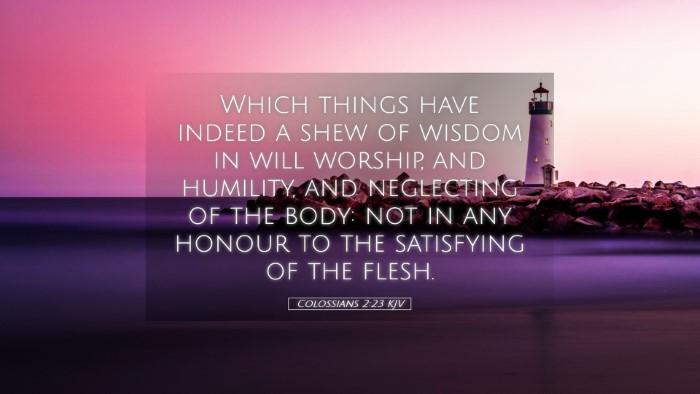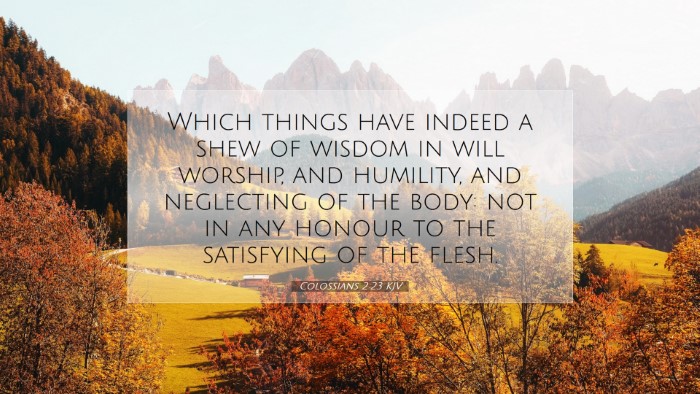Commentary on Colossians 2:23
Verse: “Which things have indeed a show of wisdom in will worship, and humility, and neglecting of the body; not in any honour to the satisfying of the flesh.”
Introduction
This verse from Colossians is part of Paul’s epistle addressing the challenges faced by the Colossian church, emphasizing the dangers of ascetic practices and legalistic approaches to spirituality. Paul highlights the difference between true Christian humility and the mere appearance of it through strict rituals and rules.
Contextual Analysis
In Colossians 2, the Apostle Paul warns against the philosophy and traditions that human wisdom promotes, urging believers to cling to Christ as the source of true wisdom. This specific verse serves as a summary of the misguided practices that some may adopt in their pursuit of holiness.
Comparative Commentary Insights
- Matthew Henry: Henry emphasizes the superficial nature of ascetic practices that aim to display piety. He argues that while such practices may seem wise, they ultimately lack the spiritual efficacy required for true faith. The "show of wisdom" is contrasted with genuine faith and devotion.
- Albert Barnes: Barnes asserts that the outward manifestations of humility and rigorous self-denial may not reflect a heart aligned with Christ's teachings. He notes that these acts are often motivated by self-worship rather than true reverence for God. Barnes encourages believers to focus on Christ's sufficiency rather than human traditions.
- Adam Clarke: Clarke elaborates on the phrase "will worship," suggesting that it refers to the voluntary humility exhibited through punishing the body without any scriptural mandate. He argues for a balance where physical discipline should not overshadow spiritual understanding and connection with God.
The Meaning of "Will Worship"
The term "will worship" signifies a form of self-imposed religion intended to gain favor with God, though it often stems from pride rather than humility. Paul critiques this approach, highlighting that genuine worship must stem from a heart transformed by the grace of God rather than through imposed rigor or ascetic practices.
Practical Implications for Believers
- Spiritual Authenticity: Paul’s critique encourages believers to evaluate their spiritual practices critically. Are they engaging in rituals that draw them nearer to Christ, or are they merely performing for show?
- Focus on Christ: The reliance on human endeavors for spiritual fulfillment negates the work of Christ on the cross. Believers are urged to lean on the grace and empowerment provided through the relationship with Christ rather than external practices.
- True Humility: Humility in the Christian context should be characterized by dependence on God rather than self-deprivation or punishment. This reflects the true calling of believers to identify with the grace extended through Christ.
The Role of the Body in Worship
Paul also makes the interesting point regarding the "neglecting of the body." While there is merit in treating the physical body as a temple of the Holy Spirit, excessive neglect or punishment reflects an erroneous view of the body’s role in spiritual life.
Commentary Insights
- Matthew Henry: Henry highlights that denying oneself physical pleasures should never replace the pursuit of spiritual nourishment. True spirituality comprises engaging both the spirit and the body in harmonious worship of God.
- Albert Barnes: Barnes mentions that the body should not be treated as an enemy to the spirit. Instead, it is to be sustained and nurtured. The neglect of the physical body can lead to adverse effects on a person’s overall spiritual health.
- Adam Clarke: Clarke insists on the importance of maintaining a healthy view of corporeal existence, integrating it into worship rather than segregating it into categories of sacred and secular.
Conclusion
Colossians 2:23 serves as a potent reminder for believers to critically assess their spiritual routines. It invites pastors, students, theologians, and scholars to explore the depth of their faith beyond the superficial practices. True wisdom lies not in the appearance of spirituality but in the genuine relationship believers cultivate with Christ, where grace supersedes rules, and authenticity replaces hypocrisy.


